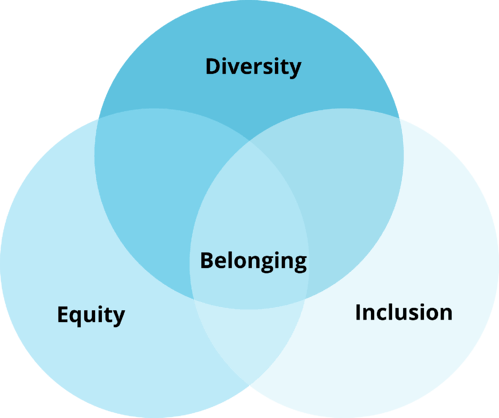A-not the-Brief Christian Theological Case for Diversity, Equity, Inclusion, and Belonging
In recent years, diversity, equity, inclusion, and belonging (DEI or DEIB) has become a politicized and divisive topic in our lives and world. Even the mention of these terms has likely caused some sort of internal response as you read. This brief article isn’t setting out to resolve those feelings and tensions.
Rather, my hope is to appeal to some Christian theological underpinnings that support diversity, equity, inclusion, and belonging in our faith and how that serves as an invitation for us to model those principles in our lives.
On diversity
Looking at the full narrative of Scripture culminating in Revelation, we see God in constant pursuit of all of God’s creation. Beyond the markings of Christ’s transforming work, we are told that there is no tribe, no tongue, no single outward identifier of God’s people but rather an eclectic tapestry of individuals and groups that make up the kin (or family) of God. Christ’s challenge to us is to look broader and wider than we might be inclined to in our understanding of who is part of this family.
We are pushed to recognize that God is at work in the places and folks we might overlook—the outsider, the downtrodden, the one with a different theological or political conviction, and even in our “enemies.” It is in seeking to embody this that we move toward a posture of embracing diversity as the gift it is, rather than something that we should overlook or try to minimize, as we strive to mirror what is to come.
On equity
Equity is not equality, though we can be tempted to equate the two. Equity is displayed throughout our Scriptures, from many Levitical laws and feasts to Jesus’ parable of the workers in the field. Often when we encounter these examples in a passage or an equitable situation in our daily lives, when we are not the benefactors of them, it can feel jarring or even unfair, as on the surface these situations appear to be individuals receiving more than they “deserve”: a relief when a debt is owed, or assistance and support that others might not understand is available to all should it be needed.
I would argue that in these displays of God’s grace, mercy, and justice, we are seeing God’s equity at work, and that this is God’s invitation for us to model these same actions in our lives. We do this by sharing and giving of what influence and power we hold to elevate and empower others—often those most unlike us and when there is no benefit to ourselves beyond knowing that a more equitable world frees us all to live and love our neighbor as ourselves in the best possible manner.
On inclusion
Like diversity, inclusion is a common theme we see in God’s character. We constantly encounter images of God seeking out humanity not only to affirm, but also to include. First in the garden, then seeking out Abraham and Moses, then with a whole people group, and finally in the Incarnation, where Christ shows over and over again how a people group had missed the mark and were keeping out the very folks God would include because of their religiosity. We also see the Ethiopian eunuch joining the house of God in Acts and Paul speaking to this well in challenging the Galatian church to understand that there was no identifier that Christ’s work didn’t overcome, and in so doing that made all “heirs,” and we are challenged not only to see ourselves as included but also, and maybe more importantly, others.
On belonging
When we belong, we understand and experience that we are accepted, valued, and heard. In many ways, true belonging is the convergent point where diversity, equity, and inclusion meet. I would suggest that the ache for belonging is also sprinkled throughout the Scriptures. It is the ache in many of the psalms, it is the longing of Christ on the cross, it is the ache we experience when we long for or feel disconnected from God and when we long for validation in our community.
It’s why Scripture reminds us of our belonging to God through Christ’s work, and it is why throughout church history our creeds and confessions have sought to unify followers of Christ through the expression of the love and convictions we share. For when we are able to rest and experience belonging, our energy and focus shift from our own need for it, and instead we are able to offer and extend it to and for others.
In closing
As the great Saint Theodore of Lasso once said, “Taking on a challenge is a lot like riding a horse, isn’t it? If you’re comfortable while you’re doing it, you’re probably doing it wrong.” So it will be in our lives of faith when we seek to embody postures of DEIB and the approaches that might confront our previous ways of doing things. It will be tough, it could hurt a little, but those can be the markers of growth and transformation as we become more and more the people Christ invites us to be—together.
For further reading, I would highly recommend checking out the following books as a starting point:
Redemptive Kingdom Diversity by Jarvis J. Williams (2021)
Called to Reconciliation by Jonathan C. Augustine (2022)
Strangers and Scapegoats by Matthew S. Vos (2022)
Reparations by Duke L. Kwon and Gregory Thompson (2021)


